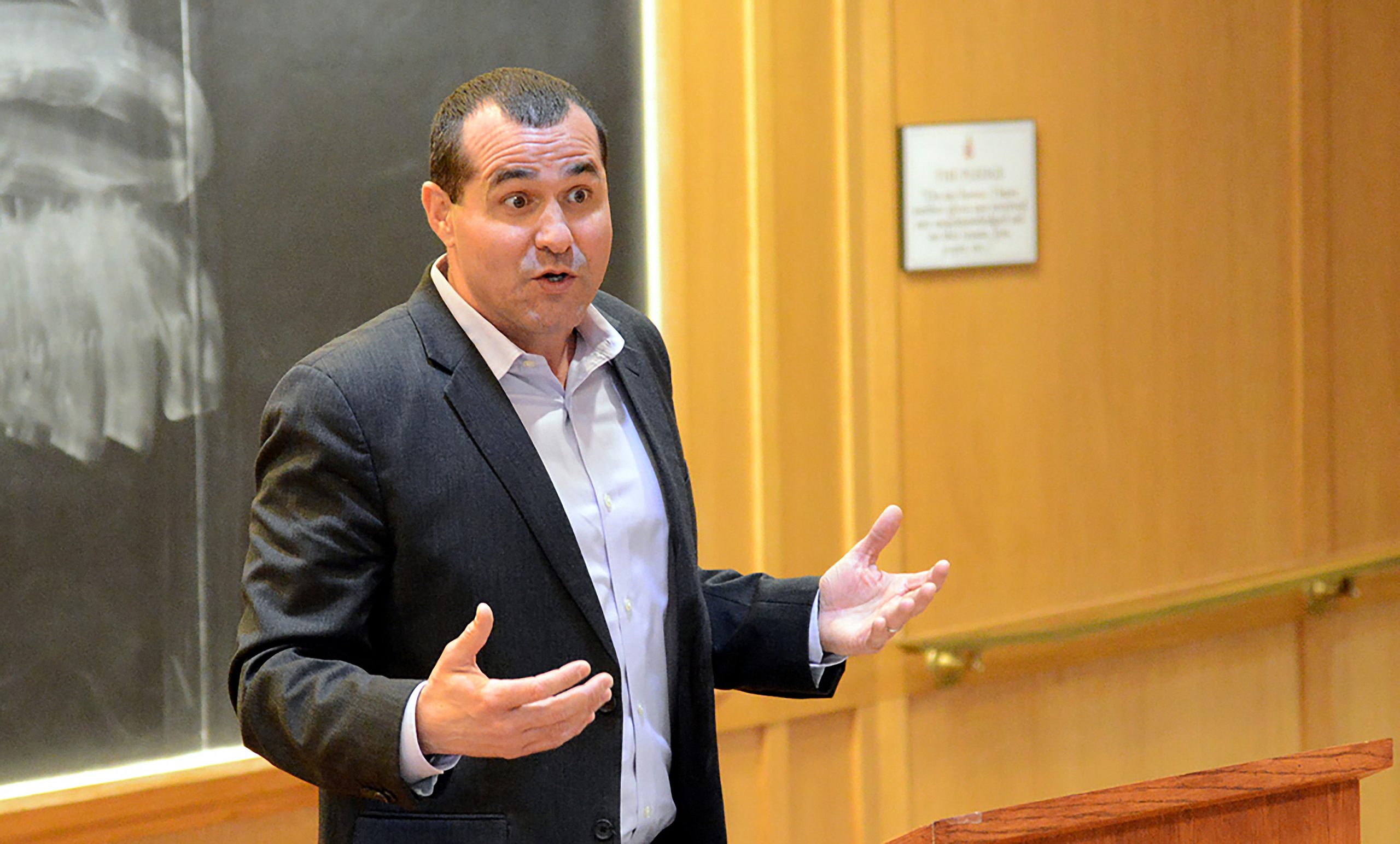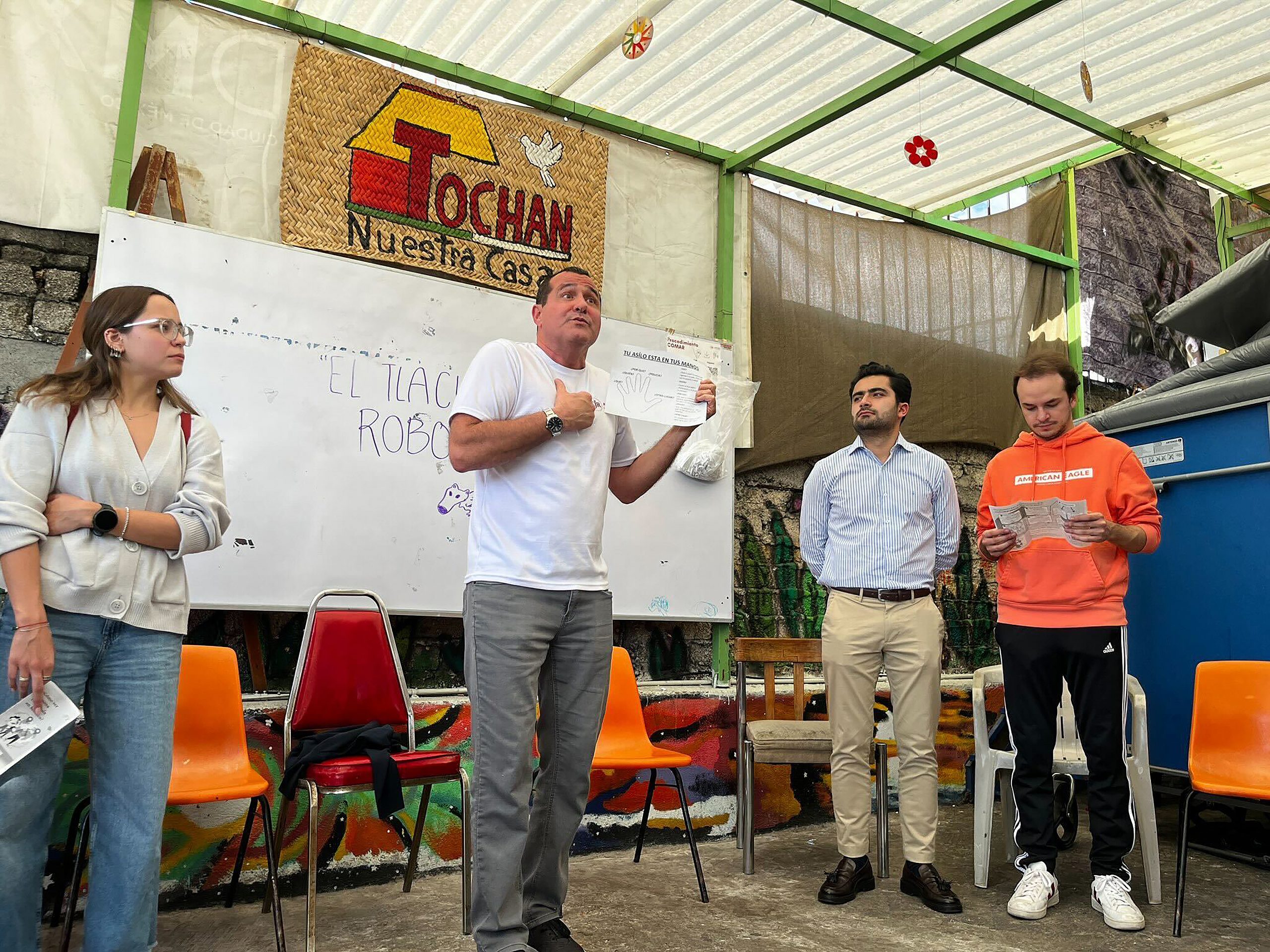The expert in immigrant and human rights is excited to help the next generation of public interest lawyers along the path to a more just future

David Baluarte teaching in lecture.
When asked what he thinks makes a successful academic dean, David Baluarte grins. “There are tremendous opportunities to channel the creativity of faculty and the energy of the student body to foster the best possible environment to educate the public interest lawyers of tomorrow. With the needs of communities shifting and social justice movements evolving—it’s an exciting project. That’s why I got into this, and I can think of no better place to pour myself into this work than CUNY Law.”
That Baluarte is eager to begin his role as Senior Associate Dean of Academic Affairs and Professor of Law at CUNY Law in January is palpable. His verve and vim are felt even through Zoom, and it’s easy to imagine him both at the front of a large lecture hall or among students in a tight-knit clinic and being equally at home. But his path to social justice advocacy, human rights law, academia, and ultimately administration has taken him well beyond classrooms. Creating pathways is a recurring theme in Baluarte’s career, from the experiences that drew him to advocacy before the Inter-American human rights system as a young man to what brings him to CUNY Law now.
“I’m a public interest lawyer by orientation and that goes to my beliefs and core values. I ended up getting into academia in large part because, as a clinical professor, I wanted to train the next generation of human rights lawyers and immigrant rights lawyers. I’m now at the point in my career where I’d like to work with a broader group of students who are committed to practicing law in the service of human needs.”
Baluarte has served as the associate dean for academic affairs at Washington & Lee University School of Law (W&L Law), where he launched the Immigrant Rights Clinic and oversaw the development of that program for a decade. He is currently completing a Fulbright with the Refugee Clinic at the Iberoamericana University in Mexico City. “I started a clinic in the Shenandoah Valley, an environment that can be unfriendly to immigrants, and came to understand that the most robust advocacy needs to take the entire immigrant experience into consideration. Through my Fulbright, I am creating cross-border connections between clinics to confront the externalization of U.S. immigration policy to Mexico. I’m working to develop a practice of holistic, transnational immigrant justice and to integrate that approach into programs of clinical legal education.”

Before arriving at W&L Law, Baluarte was a Practitioner-in-Residence in the International Human Rights Law Clinic at American University Washington College of Law, where he represented individuals and communities in cases before the Inter-American human rights system while supervising students in their representation of asylum seekers. His expertise in statelessness, refugee protection, immigration, and human rights has led him to blaze trails throughout the Americas: in Brazil, with the Center for the Study of Violence at the University of São Paulo; in Costa Rica, with the Center for Justice and International Law (CEJIL); in The Bahamas, where he directed a U.N. High Commissioner for Refugees- (UNHCR) funded project to establish a nationality rights clinic at the Eugene Depuch Law School; and in Argentina, where he completed a prior Fulbright with the Immigration Clinic at the University of Buenos Aires. Baluarte views his current work in Mexico as the culmination of his career promoting human rights in the Americas. And though he earned his J.D. from American University Washington College of Law, and his B.A. from Brown University, it was time he spent in Latin America as a young man that shaped his drive to go into social justice lawyering. One of the core pieces of advice he offers students is to “never disconnect from your roots — human rights work should be grounded in your personal experience.”
When he moved to Peru as a teenager to live with his father’s family, Baluarte became aware of the challenging impacts of endemic human rights violations across the Americas. “On a variety of levels, U.S. hegemony in Latin America created an internal struggle for me. My mother is from the U.S., where I was born and raised, and my father is Peruvian. Living in Latin America, I became intimately aware of troubling North/South dynamics of domination and subordination that create human rights challenges throughout the Americas, and in many cases lead to migration.” After studies abroad in the Dominican Republic and Chile, Baluarte took his first job as a human rights advocate in Brazil. There, Baluarte met lawyers working on the regional level before the Inter-American system who showed him that law could be a path forward. “I didn’t want to be a lawyer until I wanted to be a human rights lawyer,” he laughs. “Those lawyers showed me that I could reconcile some of my internal conflict through regional human rights work—where I could channel the strength of my own regional identity.”
After arriving in law school on a public service scholarship, Baluarte was taken under the wing of Dean Claudio Grossman to work on a case before the Inter-American Court of Human Rights in Costa Rica. It was then that Baluarte was introduced to CEJIL, an organization that specializes in litigation and advocacy before the Inter-American human rights system. He returned to CEJIL in Costa Rica as a summer intern and ultimately became a staff attorney in its D.C. office. At CEJIL, Baluarte became deeply engaged in the struggle for equal citizenship rights in the Dominican Republic. “It’s still some of the most valuable work I’ve ever done as a lawyer – working with Dominicans of Haitian descent mobilizing in bateyes to lift up their communities is perhaps the most inspirational experience of my life.” Human rights work on the regional level ultimately led Baluarte to deeply value local advocacy and the connection between people and place.
It’s clear Baluarte is eager to help CUNY Law students along their own paths to using the law for social good. “You want to give people space and room to develop their identities—you have incredible people at CUNY Law who are drawn to this place because of its mission.” He is animated when he talks about the people who work and learn and teach here. “I’ve come to understand that when you are teaching students to critique authority or systems of power, when that is your ethos, it is natural that they will hold you to account. To succeed as academic dean, I plan to follow the excellent example of Dean Sudha Setty, work to understand the many stakeholders at CUNY Law, and do everything I can to advance the academic program and interests of the institution. The ultimate project is to train the best public interest lawyers so that we can all move forward as a society and enjoy a more just future.”
